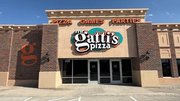Article
Leading restaurant recruiter on capturing and keeping those game-changing employees (Part 2 OF 2)
In this second part of this series on the importance of hiring innovators, we talk to recruitment and hiring company, Outmatch, for advice on how to attract and identify these types of game-changing employees in your applicant pool.

May 24, 2017 by S.A. Whitehead — Food Editor, Net World Media Group
A guiding principal of just about any business is that any brand is only as good as the people behind it. But as detailed in the first part of this series on Monday, there is increasing evidence showing the people who make your brand happen and their ability to innovate and feel a sense of ownership may from now on be even more critical to a restaurant brand's success than even that all-important investment capital that has been at the top of most strategic priorities the world over.
Today, investment capital is relatively plentiful for most viable brands, as reported at length in a recent Harvard Business Review report. The truly rare element in the restaurant industry now is the motivated and innovative employee, as well as the kind of company culture that not only attracts these types, but also retains them and gives them a sense that what they do and how they do it makes a huge difference in the future success of the business, regardless of which restaurant category the brand falls within.
As organizational dynamics expert and longtime foodservice industry leader Bobby Shaw put it, "If a culture is healthy, ideas should come up from throughout the company, regardless of where (the employee behind the idea) fall(s) on the organizational chart. The big question is, 'Are all employees encouraged to share those ideas?'"
"The first step in developing the right culture is to hire the right employees."
So that's the culture piece that keeps these innovators on board and innovating. But we wondered what was the key to both "magnetizing" these kinds of people to apply at your chain, and then how do you detect the innovative, action-oriented problem solvers in the recruitment, hiring and even ongoing retention process? For some great answers to that question, this site went to the recruiting organization, Outmatch, which recently partnered with the University at Albany (UAlbany) – State University of New York (SUNY) to combine the skills of UAlbany's industrial organizational psychology program faculty and graduate students with those of the company's research and science team to create employee selection and assessment processes that use statistical analysis to link job performance to the results of employee assessments. It's part of an increasing move to using massive amounts of data regarding types of employees that innovate and problem solve exceptionally well on the job to create assessments that identify those same types of individuals in the applicant pool.
What follows are highlights of an interview with Outmatch CMO Jason Ferrara on what the data shows about these kinds of winning employees and how companies can both get those types of individuals to take an interest in a position at their brand and how the company can identify them in the hiring process and then retain them.
Q: Are your restaurant clients making moves currently to both attract and identify innovators and "doers" in the applicant pool?
A: Absolutely. In working with clients throughout the restaurant and food service industry ...we see a common theme: success in the restaurant industry is about more than food; It’s about people. Restaurants are increasingly being treated as businesses where hiring and employing professionals is not just a goal, but a requirement. Amid stiff competition, good employees who can create a positive dining and social experience are differentiator(s) that can make or break a business ... (and) treating restaurant jobs as professional, career-based positions.
More than ever, data is being used to evaluate candidates -- from pre-hire assessments to interviews, and reference checking to develop(ing) and promot(ing) employees.
Also, as data is increasingly used in restaurant hiring, we are seeing more organizations hire HR professionals with backgrounds in data.
Q: If you could describe the kind of company culture that really promotes innovation, growth and creative thinking among staff and new hires, how would you do that?
A:The first step in developing the right culture is to hire the right employees, and ... we are helping companies use assessments to measure the core competencies of candidates (like) whether they are willing to be part of a team, open to new ways of thinking, able to accept change, and other key attributes. With that data, we can predict whether a candidate is the right fit, and enable companies to match the right people with the right jobs to ensure a culture that enables growth and success.
We are fortunate to work with many great restaurant companies, and to see firsthand the type of cultures that promote innovation, growth and creative thinking. The most effective are the ones that use their corporate values as their operating principles, and communicate those principles to every employee, from managers to servers. When every employee knows what the company stands for, and lives and breathes those values in the workplace, the result is a consistently outstanding corporate culture that generates repeat business and attracts new customers.
Q: So what do you look for in candidates that indicates that on the job they will not only feel free to innovate and contribute, but perhaps even compelled to do so?
A:The key is to identify the traits that are needed to succeed in a particular position and a certain type of establishment, and then to hire employees who possess those traits. The way to do that is by starting with an assessment that generates predictive data about a candidate, then (building) those findings (into) interviews and reference checking solutions that generate measurable data.
For instance, based on our research, OutMatch has determined the 10 most important job competencies for restaurant managers. These are applicants who show they can and will:
• Champion change.
• Coach and develop others.
• Focus on guests.
• Drive results.
• Manage others.
• Plan and organize.
• (Follow) policies, processes and procedures.
• Focus on quality.
• Stay resilient.
• Collaborate.
With strength in these areas, managers will do more than control costs and maintain sales year over year. They’ll turn mediocre stores into top performers, or take the flagship to all-new heights. You can easily measure all of these competencies using predictive personality assessments. Then, using an interview guide that enables consistent, behavioral-based questions to be asked across interviewers, further information can be gained ... about past achievements. The answers (are) scored, generating additional data. And, online reference checking delivers even more data – far more than traditional phone calls – that can be used to present a well rounded view of the candidate.
Using a comprehensive, data-driven approach to assess, interview and reference check candidates gives a company confidence that it will put the right people in place to create a culture where employees (are) compelled to innovate, one that fosters transparency, and enables them to put programs in place to allow for employee contributions and suggestions.
Q: How do you develop innovative thinking and problem solving in current employees? Can companies train for that type of thinking in current employees or train to grow that in their employees, or must they hire anew?
A:This is another area where assessments can be used to great advantage. By measuring strengths and weaknesses of employees – and tying them to the key competencies needed for success in a particular position – operators can recognize areas in which improvement is needed and tailor programs to accomplish that.
"With strength in these areas, managers will do more than control costs and maintain sales year over year. They’ll turn mediocre stores into top performers, or take the flagship to all-new heights. "
Q: What stymies this process at restaurant brands where you work with and why?
A:First, restaurant managers who are generally responsible for hiring are incredibly busy. They are often tasked with overseeing most if not all operations, from employee scheduling and personnel issues to inventory control. In many cases, they are on the restaurant floor, ensuring bar and table service is effective and efficient. And they are handling customer issues. That leaves little time to dedicate to the recruiting and hiring process.
Secondly, with unemployment rates low across the nation, the race for good employees is particularly intense. The competition you can see from your front window has their eyes on your best employees, and your employees have many options to choose from.
Q: Why then should any company make any effort to help managers make time for this?
A:Competition is at an all-time high. There has been a rapid expansion of national franchises and regional entities into new markets. Supermarkets and convenience stores are selling ready-made meals targeting busy consumers. And online options for ordering food and meals are becoming more commonplace. As a result, the customer experience is a critical driving force behind a restaurant’s success, making it essential that the right employees are in place to meet and exceed customer expectations.
Q: Where would you tell a company that wants to move more strongly in this direction for their hiring and retention efforts to start?
A: In order for this process to be successful, it’s vital that a company know what type of culture will make it successful. The leadership team must identify the traits that make people successful before that culture can be built.
But once that’s done, data-driven assessments can be used to inject measurement, insight, and impact into the hiring process to get the right team on board.
Photo: iStock
About S.A. Whitehead
Pizza Marketplace and QSRweb editor Shelly Whitehead is a former newspaper and TV reporter with an affinity for telling stories about the people and innovative thinking behind great brands.
 ChatGPT
ChatGPT Grok
Grok Perplexity
Perplexity Claude
Claude








